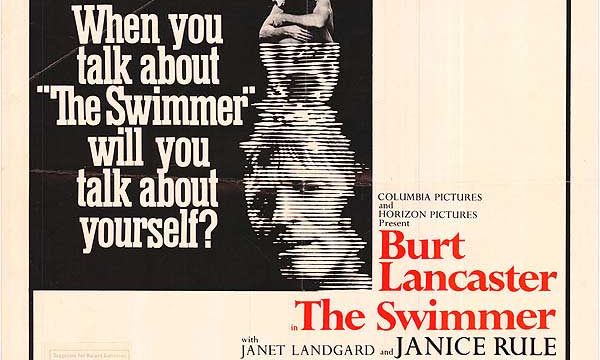Sitting poolside the morning after a party, nursing hangovers and enjoying the summer sun, a middle-aged couple are surprised – but delighted – by an unexpected visit from an old friend. That friend is Ned Merrill (in the familiar form of Burt Lancaster), clad in nothing but swimming shorts but looking healthy, enthusiastic and full of life. Gazing happily from their hillside garden, he realizes that every house between theirs and his own has a pool, and with a spark that belies his years, decides to swim home.
This is the set-up for 1968’s hard-to-classify curio The Swimmer, written and directed by the husband-and-wife of Frank and Eleanor Perry. We know nothing about Ned Merrill at first, which is intriguing – in well-off, suburban America, do men routinely turn up unannounced to swim in friends’ pools? From the opening sequence, we can assume that Merrill has come through the woods – but from where? And why? His friends’ reactions seem to imply they’re not surprised by this turn of events, but their eyes flicker with concern when he lays out his plan for the day.
Quickly moving to the next house, Ned is again greeted warmly. But there’s something wrong – Ned’s questions cause confusion, and his responses to others’ questions are little better. Do these people really know him? Just how long is it since they last saw him? The Swimmer is full of these kinds of questions. While each of Ned’s encounters as he swims across the county is fascinating in its own right, the heart of the story lies in the common elements that link them together – nobody has seen Ned in a while, he avoids direct questions, and he only wants to talk about the distant past. Any attempts to figure out his current state of affairs leads down a dead-end path. And of course, he’s on a mission – as soon as the conversation starts to stray from his comfort zone, he has the perfect excuse to leave; he’s heading off to the next pool, and closer to home.
A few houses in, he picks up a companion. Julie, a beautiful young girl swimming with friends, used to babysit for Ned’s children – struck by their renewed connection, she agrees to join in on his quest. As they move from one house to the next, she reveals that she used to have a teenage crush on him; her image of him as a flawless, god-like man matches his own arrogant view of himself. He becomes overprotective, paranoid, and she runs away, her perfect memories shattered, but not before they spend several odd minutes of screen time leaping over fences like racehorses. Though thirty years may separate them, he’s just as physically capable, right? But after she’s gone, he moves on – alone, and with a limp.
And so it goes – some of the people that Ned runs into along the way know him well, and their reactions range from confusion to contempt. Others are almost strangers, and are merely suspicious of his presence. But beyond the first couple of stops, his bold explorer’s quest isn’t the grand adventure he thinks it will be – nor is it the one the film seems to promise in those bright, early moments. Ned begins to feel colder, too – is this really the same day? Is it even the same season?
As Ned’s quest – and, by association, his world – begins to crumble, responses from the people along the way become less mysterious, and the truth starts to emerge (and, as such, spoilers follow). The Swimmer is a story of unchecked privilege; Ned Merrill is a broken man, who has lost his wife (and children) after repeated infidelities, who has been pushed out of his job thanks to younger, brighter prospects taking his place, who has no money and no home to call his own any more because he was unable to adjust to a different life without imported food and high-end liquor. One of his last pool visits is to the home of his former mistress, the person who knew him better than any of the others along his unconventional river, and now the one who hates him the most. Their conversation is brutal, and it seems at first that Ned is going to finally accept the troubles that have befallen him… but then his shield comes back up, and he’s in denial again.
Even once it has laid its cards on the table – via a devastating ending that verges on gothic horror – The Swimmer is no easier to classify, and it’s easy to see why it took a few years to overcome an initially lukewarm reaction to gather something of a cult. There aren’t many films quite like it; in fact, the main comparison I found myself making on this long overdue rewatch was with Bojack Horseman, another tale of a man who had everything and lost it entirely through his own behavior. To borrow one of the most devastating lines from Bojack, Ned Merrill “is all the things that is wrong with him”. Nobody is to blame but himself. And yet, after his bizarre quest across the county, it’s hard to feel anything for him other than pity.
Side note:
John Cheever’s short story from which The Swimmer was adapted is freely available online and makes for an interesting read. The film does an admirable job of maintaining the story’s strange tone, but some of its ambiguous nature is lost in the film’s expanded narrative.

